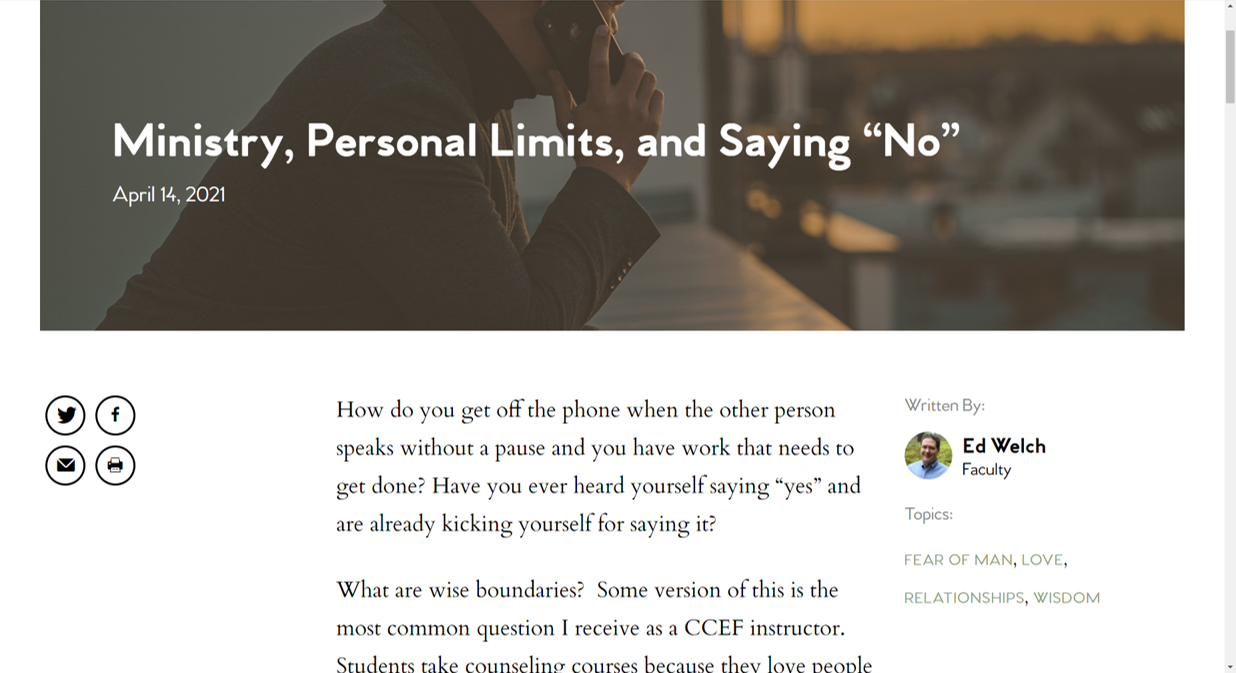[CCEF] Ministry, Personal Limits, and Saying “No” How do you get off the phone when the other person speaks without a pause and you have work that needs to get done? Have you ever heard yourself saying “yes” and are already kicking yourself for saying it? What are wise boundaries? Some version of this is the most common question I receive as a CCEF instructor. Students take counseling courses because they love people and want to care for them even better. Most of them, however, are already neck-deep in ministry; during a course they deepen some of those relationships and add a few more. And they wonder if the trend toward more and deeper conversations can continue much longer. You already know some of the questions to ask: Do I think I am that necessary? Am I afraid to disappoint people? Have I been able to set priorities for how I use my time? Do I know that every yes is a no to something or someone else? Have I learned from the cost of my yesses in the past? These questions are important and point us in a good direction, but saying “no,” like everything else that calls for wisdom, is complicated. The idea of sacrificial love creates one of those complications—Christ sacrificed himself for us; we should be willing to sacrifice for others. The Golden Rule is love’s companion, always on standby to turn a no into yes. How would you want to be treated? As a result, as soon as we have our guidelines in place, we find reasons to make exceptions. If I make a rule about getting seven hours of sleep, wouldn’t I immediately violate it for people I love? Sometimes love will be inconvenient or have a cost. We expect that. The problem is when it seems to be relentlessly costly for ourselves or other people. Then some decisions might be in order. So, you gather advice from others. Here are three pieces of wisdom I remember from friends. Aim to simplify your lifestyle. If it feels like chaos, look for parts that can be removed (e.g., social media). When someone asks for your time, don’t say yes immediately, unless a yes is obvious. You could say, “Let me check with _______ first.” Or, “Let me check to make sure there is nothing else scheduled.” It would be best if these were not lies. When you have not had time in prayer for a couple of days, say no. Good advice, which I occasionally follow, sort of. Saying no is more challenging than it might seem, so push further into that question of human limits and wisdom. How much time do I spend on entertainment and social media? The more time you spend here, the more harried you will feel in the rest of your life. If I limited my ministry conversations, what would I do with the extra time? One qualification for this question is this: We can always become more efficient with our time. Efficiency, however, is not always a worthy goal. Do you really want to cut ten minutes off your dinnertime, or up the pace of life from a walk to a jog? How do I think wisely about the pace of my life? The pace of a day, a week, and a year? Is it good for me to have slower-paced sections in my day or week? Is it wise for me to have time that is not populated by other people? Are there limitations I have now—young children, aging parents, physical health—that bring more noes to this season? Our life should have rhythms that alternate between busyness and rest. Is this a season in which I should learn how to ask for help myself as well as learn how to say no? How do I distinguish between inconvenience, people who drive me crazy, people who keep talking, and foolish decisions? Each is handled differently. Is the real question: How can I have briefer conversations when I am not so sure that the conversations are fruitful? Most people are happy to have “good” conversations. These are a delight; they are rarely burdensome. The problem is when other people seem to be stuck in their complaints or anger, or they simply take so much time talking and don’t seem to be getting anywhere, or you feel like you are being used more as a prop than a friend? How can we redirect a languishing conversation? How can we interrupt a person who is in the midst of one very long sentence? How can we end a conversation? All these are important questions for another time. You can be certain of this. Limits and rhythms will always be an important topic for you, and you will rarely feel like you finally have it right. Advice might help, but what works for your friends might not work for you. Asking the right questions will help, and they can inspire you to pray and keep learning from Scripture and other people.
[1] Since this is such a common problem, you can find helpful comments most anywhere. One place is the Biblical Counseling Coalition website and the blogs by Anna Mondal, Love, Limits, and Mending Fences (Part 1 and 2). David Murray’s book Reset: Living a Grace-Paced Life in a Burnout Culture will also be a helpful partner for you.
| |||||||||||||||||||